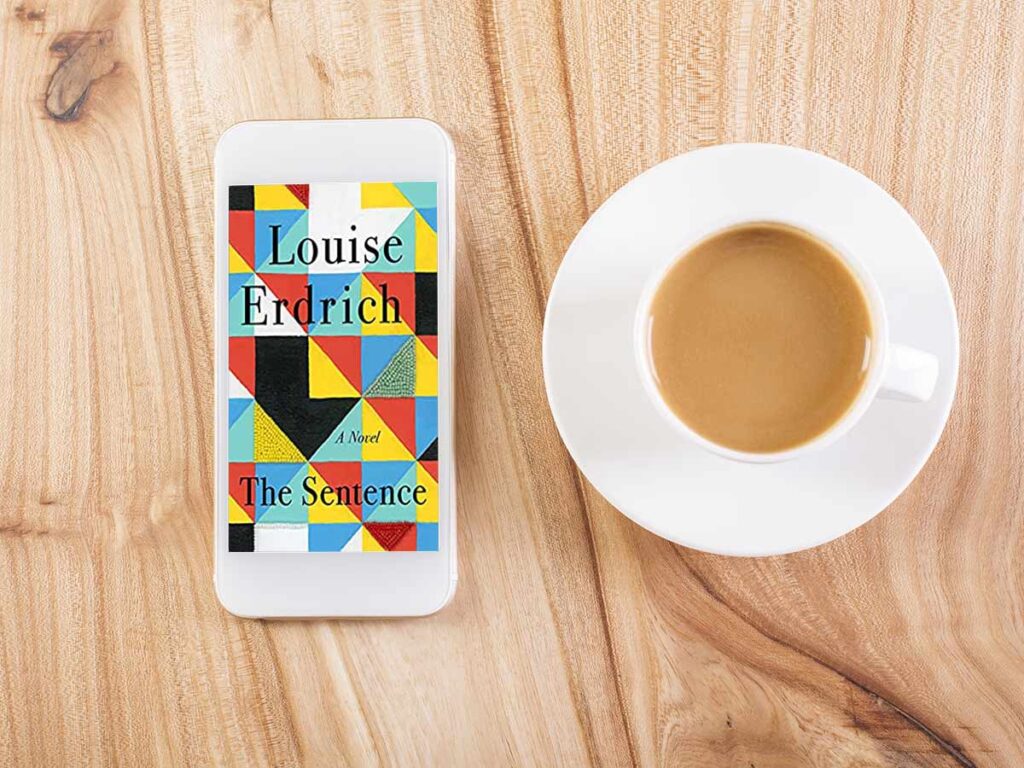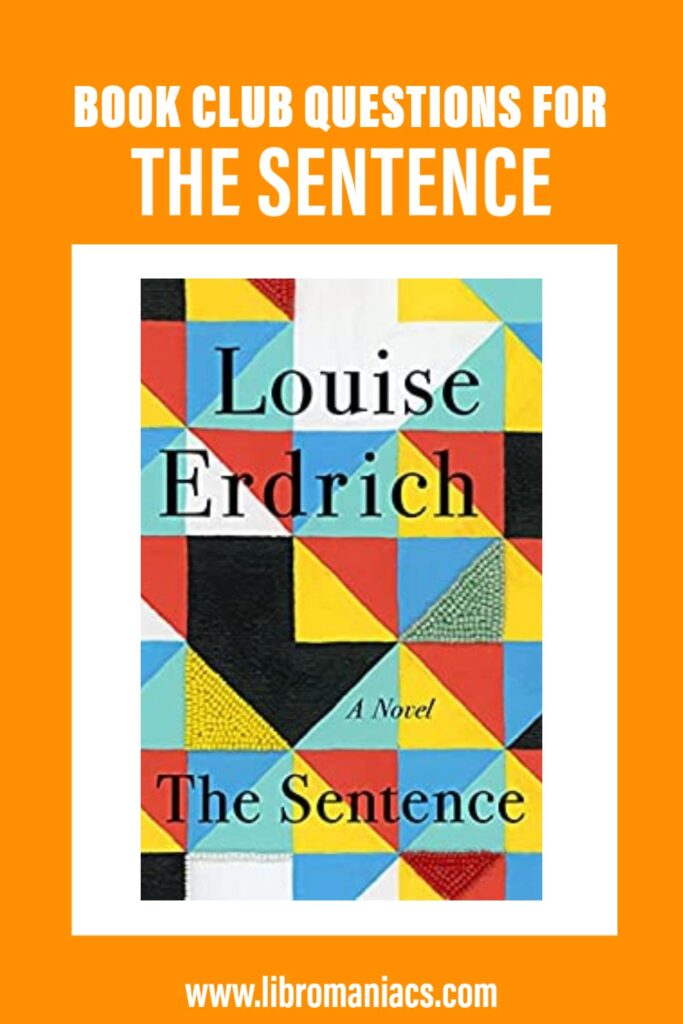What Louise Erdrich has accomplished with The Sentence is far more that your typical cozy bookshop novel. She’s packed in a ghost story, a redemption story, notes on the value of family (whether by blood or choice), cultural appropriation, the BLM movement and the melancholy of the COVID shutdown.
Pick any one of those threads and you could have a good book group conversation. But discussing how all of these threads weave together (or don’t) will give you fodder for a great conversation. And this guide is meant to help you get started with our The Sentence book club questions.
Start with the synopsis below, does it begin to describe the complexity of the novel? Then use our discussion questions for The Sentence, along with some thought-provoking review snippets to get the conversation started.
We’ve also culled a few books from Tookie’s recommended reading as our recommendation for your next great read.

(This article contains affiliate links. This means that if you choose to purchase, I’ll make a small commission.)
The Sentence Synopsis
The Sentence, Louise Erdrich
Louise Erdrich’s latest novel, The Sentence, asks what we owe to the living, the dead, to the reader and to the book. A small independent bookstore in Minneapolis is haunted from November 2019 to November 2020 by the store’s most annoying customer. Flora dies on All Souls’ Day, but she simply won’t leave the store. Tookie, who has landed a job selling books after years of incarceration that she survived by reading “with murderous attention,” must solve the mystery of this haunting while at the same time trying to understand all that occurs in Minneapolis during a year of grief, astonishment, isolation, and furious reckoning.
The Sentence begins on All Souls’ Day 2019 and ends on All Souls’ Day 2020. Its mystery and proliferating ghost stories during this one year propel a narrative as rich, emotional, and profound as anything Louise Erdrich has written.
10 The Sentence Book Club Questions
These questions have been tailored to this book’s specific reading experience, but if you want more ideas, we also have an article with 101 generic book club questions.
- “Louise” is the bookstore owner and also an author, perhaps “the author” of the novel. It seems very meta. Is the book meant to be somewhat autobiographical?
- “The door is open. Go!” Tookie reads this as one of her initial dictionary definitions. How does this notion drive the narrative. Have you ever seen an open door and bolted through it?
- 10% into the book and Tookie has already been to jail, gotten the bookstore job and been married. How did you find the pacing? Was the initial part rushed? Or was it simply meant to set the scene for the more recent events?
- Talk about the “Indian wannabes”, as Tookie calls them. You know, the “I was Indian in a former life” or “my grandma was an Indian” tropes. Like that woman in blue who wanted to share stories of her grand whoever who helped the starving Indians (but wasn’t willing to give up the land to them)…the same woman then who later dropped off the bones.
What are these people after? What are they trying to achieve? - While Tookie was in prison, Jackie saved her with books. She also helped Tookie get the job at the book store. Discuss how Jackie was a catalyst for Tookie’s redemption.
- Tookie’s nightstand has The Hard Stack and The Easy Stack. Do you have a similar way of prioritizing your next reads? Assuming that you have “a stack”, how do you choose your next read?
- “So the word with its yawning c, belligerent little e’s, with its hissing sibilants and double n’s, this repetitive bummer of a word made of slyly stabbing letters that surrounded an isolate human t, this word was in my thoughts every moment of every day”… says Tookie about the definition of “sentence”
How are all the sentences in the book related? Tookie’s prison sentence, the delicious sentences within the books that Tookie recommends, and the book called The Sentence and the (nearly deadly) sentence within it which sent Tookie into a kaleidoscopic tailspin. How are these various sentences related? How do they drive the narrative? - Half way into the book, Erdrich gets to COVID and the subsequent BLM protests which gutted Minneapolis. Could the book have been just as effective if not set against these convulsive events?
- “Five days after Flora died, she was still coming to the bookstore. I’m still not strictly rational. How could I be? I sell books. Even so, I found the truth of this hard to accept.”
Flora is a contradiction. She was a good customer, but also stole the book. She means well, dropping off potpourri, but then she’s also a clumsy appropriator of culture. She shops at the store, but later haunts it. Do you believe in ghosts? What was Flora’s role in the story? - Dissatisfaction is a positively voracious reader. After reading Deacon King Kong, he tells Tookie that he’s been transformed. Tookie ruminates, “That he could change because of a book brightened me up. It was the same with a lot of people who called to buy books.”
Have you ever had that moment of transformation from reading a book…or experienced the glow from having recommended a transformative book?
Selected Reviews for The Sentence
“Not many authors could include all the things Erdrich does in this novel and make it work. A haunting, a bookstore, COVID, motherhood, George Floyd’s death and the ensuing protests, marriage, quarantine, and more.”
“I feel quite conflicted over The Sentence. Although I loved the first half of this novel I found the latter to be boring and somewhat disjointed. While I’m sure many will be able to love everything about this book I wish it hadn’t quite tried to juggle so many different themes and genres.”
“To my dear Goodreads friends that adored this book, I apologize for having to sit out this particular dance. It’s not that I loathed it; I just didn’t feel particularly moved by it. I didn’t want to get out of my chair and let loose. The rhythm threw me off quite often, and the character of the tune was just too angular for my taste. I prefer something a bit more lyrical.”
“The overall mystique of the novel is woven with dark humour, sadness; grief; but an abundance of love, hope and healing.”
3 Books Like The Sentence
Normally in this section, we recommend books that have similar themes, settings or tones. If we were doing that here, we might recommend There There (Tommy Orange, urban Native American story) or The Storied Life of A.J. Fickrey (bookstore setting, loving relationships).
But Tookie recommends a ton of books in the novel, and Erdrich herself included a list in the appendix. So we have culled three of our favorite reads from that list of books and authors.
If you are interesting more stories with Covid plotlines, check out our discussion guide for Wish You Were Here. And if you want more bookstore settings, check out these books about bookshops.

Deacon King Kong, James McBride
It’s 1969 in NYC and the action kicks off with elderly “Sportcoat” shooting the local drug dealer. No one’s really sure why he did it. But it’s obvious that Sportcoat, a deacon at the local church, has been in a tailspin since the recent death of his wife.
McBride masterfully weaves together the mystery of the shooting with a diverse set of characters that include other gang members, the police, the Italian mafia, the “ladies” of the church (who are their own kind of mafia) and Sportcoat’s friends (and partners in crime). The book is surprisingly bittersweet, warm and melancholy.

Between the World and Me, Ta-Nehisi Coates
This is a great pick if you want to explore more about why the BLM movement exploded in the way that it did.
How can we have an honest reckoning with our nation’s fraught, racist history? And how do we free ourselves from this burden?
These are the questions that Coates poses in this open letter to his son. He’s not hopeful, that’s for sure. But he’s earnest, raw and heartfelt. And he wants to give his son (and you the reader) an honest assessment of his life experience as a Black man in America.
If you want the full gut-punch, listen to it on audio.
If you choose to read this for book club, check out our discussion guide for Between the World and Me.

Quartet, Jean Rhys
In Quartet, Rhys presents a version of 1920’s Bohemian Paris. This is a fictionalized account of Rhys’ own abandonment by her imprisoned husband and her fraught affair with a married man. It’s not all nightclubs and champagne for her. She has to scrape by using whatever means possible.
And if you like a Parisian setting, we also have a whole list of books set in Paris.
Have a listen on Audible. Try audio books for free for 30 days.
Share these book club questions for The Sentence with your friends:

